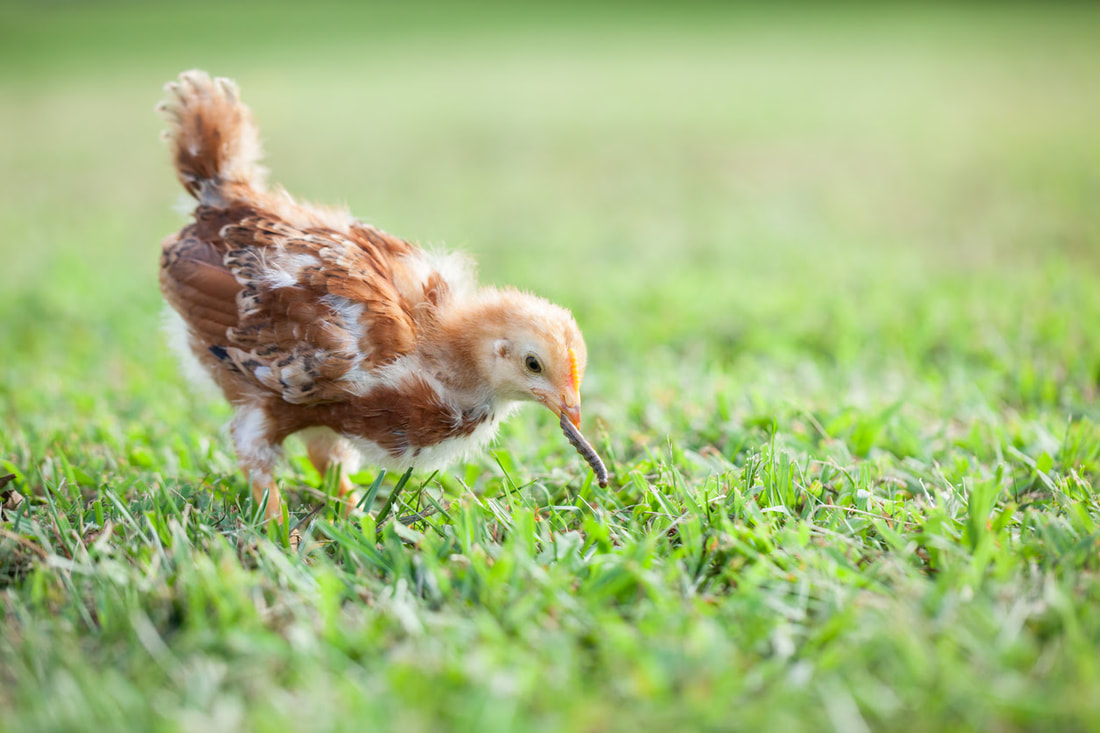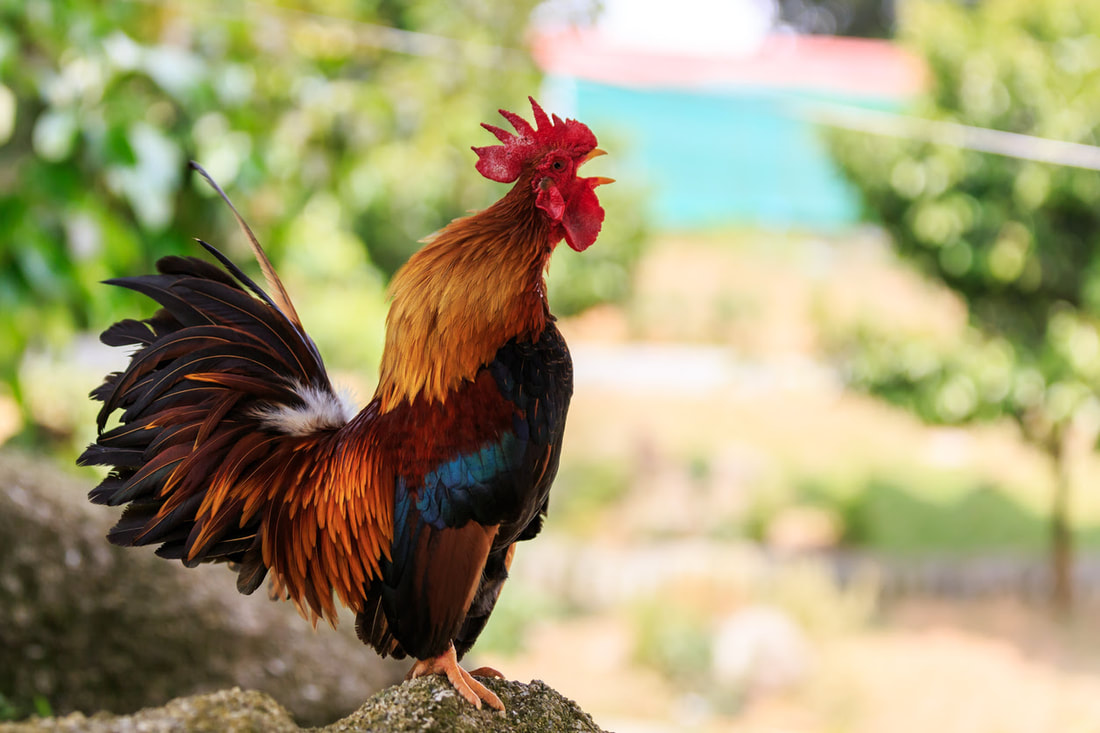|
If there's one thing chickens love, it's insects! We might have their lack of taste buds to thank, or maybe chickens know how good insects are for them.
They'll eat just about any type of creepy-crawly, including ticks (which aren’t insects, but are closely related to spiders!). Eating these not only makes your yard a safer and more comfortable place to be, but it's good for your flock, too. Benefits of Eating Insects Insects like crickets and grasshoppers, and other arthropods such as millipedes and spiders are a good source of protein for chickens. In addition to being nutritious, chasing down these meals fulfills your chickens' natural instinct to forage for their food; a free (and fun!) source of food for your feathered omnivores. Remember that no matter how "buggy" your yard is, chickens cannot survive on these alone. Be sure to feed your flock complete feeds regularly, and always have clean water available. Some Words of Caution Certain types of flies are not only annoying, but they are harmful to chickens. House flies and blow flies (the metallic blue and green flies) can cause a skin condition commonly called "flystrike." These flies are attracted to droppings, leftover and rotting food, and untreated or open wounds on your animals. Because flystrike can be fatal, it's important to keep your coop and the area around it clean. If your chickens are free-ranging, be mindful of harmful pesticide use on your lawn or garden. While your chickens are foraging, they will be exposed to any chemicals applied in their environment. Pesticides may make your birds sick, and we know how precious your flock is to you! Supplementing Nature's Supply Depending on where you live and how hungry your chickens are, you may want to supplement your local insect supply. If you have the time and space to raise your own larvae on food scraps from your kitchen. Popworms! Live are an excellent choice. If you are interested in building a container for raising PopWorms! Live that can automatically provide the mature larvae to your chickens, check out this past blog post. Chickens love to chase after their snacks. For chicken keepers who don't want to deal with live insects, PopWorms! ECO and PopWorms! PRO are at the intersection of nutrition and convenience. Sold by the pound, these dried black soldier fly larvae offer up a nutritious treat with a puffy, crunchy texture. Whichever type you choose, your chickens are sure to love them! Use the code LABOR and receive 20% off orders of PopWorms! ECO, PopWorms! PRO, and PopWorms! Live (valid until 9/6/2019)!
0 Comments
So you've taken the leap, bought the chickens, and now you're dreaming about all the fresh eggs and other benefits your new coop will bring you. But, now you are wondering: who knew chickens could be so noisy? Don't worry, you're not alone. Navigating the noise of domestic chicken flocks is one of the most frequently searched questions for prospective backyard farmers, but luckily the problem isn't insurmountable.
Breed Matters When it comes to deciding what birds fit your needs, research is key. Certain breeds, like the free-range loving Ancona, are hardy and intelligent, but tend to be pretty vocal. Calmer breeds, like the tenacious Australorp or the beautiful and broody Orpington, are quieter, and might be a better fit for your home coop. Whatever the breed, roosters will always be louder, and they can create drama in your flock. Time and Reason Many breeds of chicken are naturally quiet, but even these birds will speak up if given a reason. Pay attention to the sounds your birds are making and when. Chickens will often make an excited noise when laying an egg, or cluck busily after laying as though to announce her accomplishment. They are also much more vocal when they feel in danger, so heightened noise levels may mean that your birds are uneasy. Make sure you're providing them with a safe shelter they can retreat to when they feel threatened. Which brings us to the next point. Relaxation Depending on the breed, your chickens will likely need 12 to 14 hours of light in order to lay, but providing a sheltered, safe-feeling space for them to retreat is just as important as giving them access to the outdoors. Nervous chickens are noisy chickens, so if your birds are constantly clucking, it might be that they're telling you they don't like their coop. Regulations As with all aspects of backyard farming, it's important to know the rules. Look into your local sound ordinances, or any specific restrictions your area may have on raising chickens. You don't want to literally bet the farm on keeping your coop a secret, only to have the chickens themselves give it away. Additionally, many localities have laws against owning roosters but not hens, so make sure to study up! August is here and chicken fanciers everywhere struggle to keep their beloved chickens comfortable. First things first though, you need to know the signs heat stress in poultry:
If you're seeing any of the above symptoms you need to act NOW to cool your birds. Obviously, fresh drinking water is key. Start by offering your birds lots of fresh, cool water. Water pans (especially metal or black rubber) can get pretty hot during the summer. Very hot water is not appealing at all to poultry, and unless you've got automatic watering systems you'll need to put some extra effort into providing adequate cool water. Put out extra water pans. Keep them in the shade if you can. Bring down the temperature in your yard rapidly by spraying your whole yard down with a water hose. Spray it all, bushes, trees, fences, go ahead and spray the coop exterior. You can spray inside too if no one is setting. Some breeds, and some individuals for that matter, may enjoy a hop in a kiddie pool with a few inches of water in it. Put it in the shade if possible. Shade helps a lot! You can either purchase poultry shade systems or rig up something of your own. You can get pretty creative, nail tarps over fenced corners, hang old banners between fence posts, bust out the canvas canopy that's sitting in your garage. Re-purpose camping tents by setting them up and cutting out the sides and bottom. Right now aesthetics don't matter so much as lowering the temperature and UV exposure for your birds. Take a look at your coop. Is it clean and well ventilated? Open any shutters and vents. If your chickens are plainly suffering you can set up fans, however they may be a bit of a fire hazard. Don't leave the yard if you have fans running. One last bit of advice. Some people like to give their chickens frozen fruits during the hottest summer months. This is cute and fun, but remember that sugar increases body heat, and that your chickens will actually maintain a higher body temperature to digest frozen goodies. So while frozen fruits can be a yummy snack and fun to feed, don't feed it when your chickens are experiencing heat stress. Save those for tomorrow morning before it gets hot. |
PopWorms!®
|
|
Site Map
|
Products
Dry Products
PopWorms!® ECO Popworms!® ECO Bulk PopWorms!® PRO Live Products PopWorms!® LIVE PopWorms!® Leftovers |
Shipping
Site-wide
Free Shipping Over $25 |



 RSS Feed
RSS Feed


